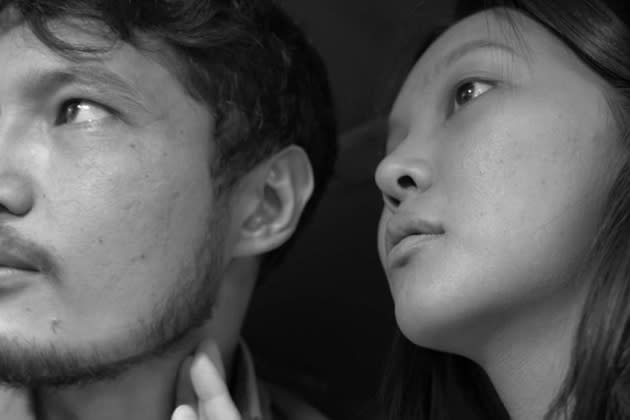Venice Review: Kim Ki-duk’s Final Film ‘Call Of God’

After a lifetime spent creating outrage and offence, both on and off screen, Korean master Kim Ki-duk has left the world with this final film, finished by his friends after his death. The story of a passionate affair that curdles almost immediately into jealousy and hate – but ends on a lyrically wistful note – is a startlingly appropriate rogue’s epitaph.
Call of God was shot in Kyrgyzstan, Estonia and Latvia in 2019. Kim died of complications from Covid in late 2020 at age 59; the film was assembled by Artur Veeber, his Estonia-based producer. Sexual manipulation, seething violence, spiritual yearning and the consoling beauty of the natural world – all the signal elements of his work since his debut with Crocodile in 1996 – are here. It is a minor film but, like everything he made, distinctively his.
More from Deadline
Casey Affleck: "I've Seen Blonde And It's Incredible" -- Venice
'Luxembourg, Luxembourg' Filmmakers Issue Plea For Ukraine's Families - Venice
A Man (Abvlai Maratov) and a Girl (Zhanel Sergazina) meet at a street crossing. Kim shoots in creamy black and white. His characters are geometrically framed by an avenue of trees leading back into a park, with the camera set squarely in front of them. The Man asks for directions to the Dream Café, which is conveniently nearby. He is flirting smoothly with The Girl when a young lad snatches her handbag, which he recovers after a chase and a scuffle. Then he asks her to dinner. In look and feel, the whole scene – which seems to be setting the tone for the film to come – is recognizably a ripple from the French New Wave. Even Sergazina’s dress, a short white shift, could have been lifted from the Umbrellas of Cherbourg wardrobe.
This borrowed insouciance makes what follows seem all the more bizarre. After their first meeting, The Girl answers the phone in the middle of the night to hear a mysterious voice telling her that she has just dreamed meeting a man who asked the way to a café. She admits this is true. If she wants to know what happens next, says the voice – or perhaps it should be The Voice – she must go back to sleep. She may want to stay awake, however, because whatever happens in her dream will also happen in real life. She chooses to dream on.
Within a day, she and The Man are having hot sex in his car. Then she realizes he is already embroiled with other women, including the owner of the Dream Café, and is consumed with a fiendish jealousy. Telling him he must be hers alone, she forbids him to speak to another woman, then insists she will move in with him to ensure he plays by her rules.
For a few nail-chewing minutes, Call to God becomes a horror film with The Man as its plaintive victim. Then his own need for control resurges. Thus follows a frenzied descent into madness, frequently clunky but strangely gripping, before drifting into another dream that may – or may not – fulfil the promise of the title. Director Kim’s god lurks suggestively in details – the petals of flowers, the snow gleaming on the surrounding mountains – but is otherwise elusive. The Devil, on the other hand, is everywhere.
Venice Film Festival: Deadline’s Complete Coverage
Kim has long been criticized within Korea for his depiction of women as vapid, screeching and frequently knocked about. Most particularly, he has reveled in graphic sex scenes, sometimes grotesquely configured, that were roundly reviled at home and helped ensure his films rarely did well at the local box office. They have, however, won him many prizes at international film festivals, where their furious energy and iconoclasm won him a loyal following.
In 2017, general disapproval of Korea’s bad boy hardened into opprobrium when he and one of his male stars were accused of rape by an unnamed actress. Other allegations followed, detailed in a hard-hitting television report in 2018 that damned his reputation for good. As a result, for several years he worked only internationally. Call of God was made in Russian with Kyrgyzstani actors, and he had plans to make his next film in Latvia. Korean unions and women’s organizations have objected in strong terms to his final film being given a Venice slot. Artistic director Alberto Barbera responded to press questions that “the separation between the man and the artist is inevitable.” It is an argument that could run forever – not something that will happen to Call of God.
Kim Ki-duk always made films in the rough, occasionally with transcendent results. Call of God certainly has transcendent moments: the dappled light through trees on The Man’s car windscreen, which overwhelms their banal argument about whether to have sex or not, is an inspired image. There are flares of his taboo-busting nastiness, such as the couple sinking into an embrace on his former girlfriend’s fresh grave, that are every bit as bracingly offensive as his fans would want. It is not quite enough, however: this is one for Kim Ki-duk completists. It is by no means just a whimper, but the Great Offender goes out with a very small bang.
Best of Deadline
Sign up for Deadline's Newsletter. For the latest news, follow us on Facebook, Twitter, and Instagram.

